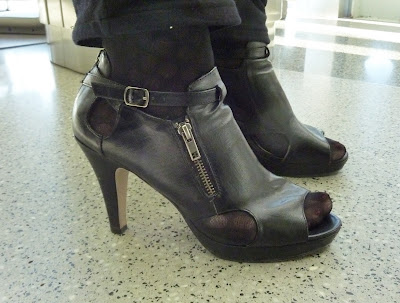First, not every airport has a body scanner. As of 11/20/2010 there were 385 scanners in 68 airports. Note: new ones are being added all the time, so if you're flying and you want to know if there is one at the airports you're visiting, Google "airports with full body scanners". Each one costs between $150,000 and $170,000 so perhaps that's a factor in their slow implementation across the country. I'm also guessing that this cost will make it prohibitive to put one in smaller airports like the one in my hometown.
Knowing the airport has a scanner may be useful information, but knowing which security checkpoint has them is also important. Sometimes airports don't have scanners at every checkpoint. I was really surprised, for example, that there wasn't one at Reagan airport in Washington, DC - at least not at the security line for American Airlines.
Seeing a scanner at a specific checkpoint doesn't mean that its an option. Are they in working order? I'm not sure why, but I've been through a couple of airports lately (Chicago, Ohare and Charlotte, NC) that had scanners but had them roped off. I'm not sure if they were broken or if the TSA agents assigned to them were out to lunch. So I asked - and was told "I'm not sure, I think they're changing something". As I watched, it appeared what they were changing was the shift of workers. It just seemed odd that the expensive and supposedly more thorough machine was just roped off while they did this.
 |
| There always seems to be a lot of TSA agents. Here there were 8 (2 not in the shot) and this was for one line. I wonder how they determine how many individual TSA agents are necessary? |
With the numbers of passengers going through the Orlando airport, they no doubt need this process. However, the process is set up in a way that requires you to select a specific aisle - and there are several aisles, each one leading to a different security station/conveyor belt. Had I wanted to go through the body scanner, I wouldn't have known which line to pick because there weren't any signs specifying metal detector vs. scanner.
So, when you get to the starting point of the security process, you may want to scope this out before selecting a line. My suggestion would be to ask the first TSA agent who is doing general checks (ie checking to see if you have more than two bags with you, etc) at the entrance to security- "do you have a scanner?" and if they do, ask them if there's a specific line you should get in to either use the scanner or to avoid using the scanner.
Note: if you have a metal implant (artificial knee or hip) you might want to consider the scanner. The implant will trigger most metal detectors which will result in a "pat down". I don't think the "pat down" is really an issue other than it takes time....just waiting for the same gender TSA agent to come pat you down can sometimes take several minutes. Gone are the days when you could carry a card from your physician stating that you have an artificial/metal implant. I remember my dad had one and all he had to do was show the security person. Now, I suppose anyone could create a "fake" card very easily.





















